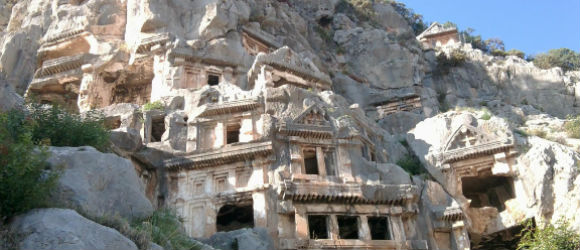The area now designated the Antalya province is the general center of classical Lycia. Milas was included by some writers in the district, but the more important cities seem to have been Patara (Gelemls) in the Xanthus Valley, Telmessus (Fethiye), and Myra (Demre). Perhaps it is Lycians who are mentioned in an Egyptian account of the Hittite battle at Kadesh. They may also be the Luqqa of fourteenth and thirteenth century Hittite documents.
Lycia was a geopolitical region in Anatolia in what are now the provinces of Antalya and Muğla on the southern coast of Turkey, and Burdur Province inland. Known to history since the records of ancient Egypt and the Hittite Empire in the Late Bronze Age, it was populated by speakers of the Luwian language group. Written records began to be inscribed in stone in the Lycian language (a later form of Luwian) after Lycia’s involuntary incorporation into the Achaemenid Empire in the Iron Age. At that time (546 BC) the Luwian speakers were decimated, and Lycia received an influx of Iranian speakers.
Lycia fought for the Persians in the Persian Wars, but on the defeat of the Achaemenid Empire by the Greeks, it became intermittently a free agent. After a brief membership in the Athenian Empire, it seceded and became independent (its treaty with Athens had omitted the usual non-secession clause), was under the Persians again, revolted again, was conquered by Mausolus of Caria, returned to the Persians, and went under Macedonian hegemony at the defeat of the Persians by Alexander the Great. Due to the influx of Greek speakers and the sparsity of the remaining Lycian speakers, Lycia was totally Hellenized under the Macedonians. The Lycian language disappeared from inscriptions and coinage.
On defeating Antiochus III in 188 the Romans gave Lycia to Rhodes for 20 years, taking it back in 168 BC. In these latter stages of the Roman republic Lycia came to enjoy freedom as part of the Roman protectorate. The Romans validated home rule officially under the Lycian League in 168 BC. This native government was an early federation with democratic principles; these later came to the attention of the framers of the United States Constitution, influencing their thoughts.
Despite home rule under democratic principles Lycia was not a sovereign state and had not been since its defeat by the Carians. In 43 AD the Roman emperor, Claudius, dissolved the league. Lycia was incorporated into the Roman Empire with a provincial status. It became an eparchy of the Eastern, or Byzantine Empire, continuing to speak Greek even after being joined by communities of Turkish language speakers in the early 2nd millennium. After the fall of the Byzantine Empire in the 15th century, Lycia was under the Ottoman Empire, and was inherited by the Turkish Republic on the fall of that empire. The Greeks were withdrawn when the border between Greece and Turkey was negotiated in 1923.
Lycia today is a substantial component of the Turquoise Coast. It is of interest not only for recreation and sport, but as a location of antiquities going back as early as the Bronze Age. The ruins of ancient Lycia are seemingly everywhere. For reasons unknown, perhaps isolation, recycling of the building stone was minimal compared to other regions.
Lycia,


Lycian Rock tombs can only be seen from Dalyan River – a few tombs in the rock face with some greek history behind them – we got a five minute lesson while in our African Queen river boat as part of an 11 hour day of boats, boats and more boats!
Went on a boat cruise and got to see these tombs as we passed by. It was a lovely experience and a highly recommended!
Dalyan was a great little beach town with great character. Summer is probably super fun there, but crowded. These tombs are very cool and a must see if you're there.
The tombs are lit up at night and many of the lovely restaurants face them which makes a lovely romantic night also you can go on late night boat rides it really is fantastic
We did this as a check out trip as i flight was not till 2:40am! you get a tour guid who tells you about the history of the tombs.
Well worth going to see!
Do it!! Lovely boat down the river ….booked through Thomas cook picked up from hotel… On our last day before going home!! Lovely lunch in riverside restuarant included
This was right outside are hotel and yes what a picture they light up at nite so romantic and looks like gold
The whole experience of the women taking you over the river in a rowing boat starts of the experience. Remember that the price paid is return as I tipped the women the same money coming back. Good to see up close and free.
Nice to see but thats about it, too long a stop at them
interesting to see, part of another trip – built 2500 years ago by 3000 slaves. Pictures uploaded soon